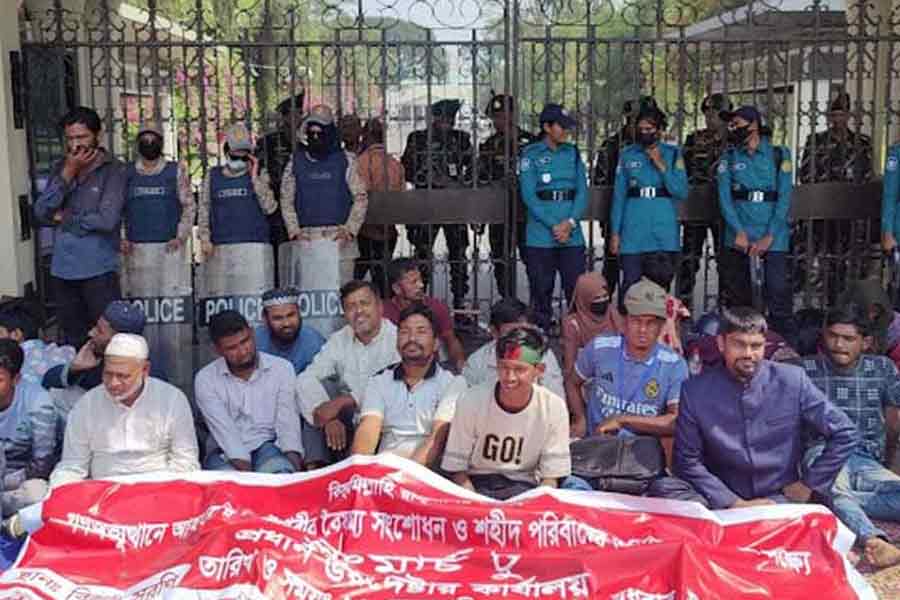July Uprising injured protesting outside Chief Adviser’s Office for two days

Published :
Updated :

A group of people injured in the July uprising have been staging a sit-in, blocking the entrances of the Chief Adviser’s Office (CAO) in Dhaka’s Tejgaon for two days to press home their demands.
They allege that the government "does not care" about them and that the people in the interim administration are "hypocrites".
They also called another section of the injured who were demonstrating earlier as “brokers”.
On Thursday afternoon, around 30 injured people were protesting at the CAO’s gate No. 1.
Police and army personnel were behind and around them.
Local and foreign media workers were conversing with the protesters.
Md Masud, an injured protester who has been there since Wednesday, said a bullet had pierced through his right hand in Mohakhali during the movement.
He said they do not accept the three categories for the injured initiated by the government. They want two categories, “A” for those who lost their ability to work or are disabled due to the injuries, and “B” for those who are active even after being injured.
According to him, there are about 1,500 injured people across the country. Many are on their way to Dhaka. Many people are not in a position to travel long distances at the moment.
He said their associates are in protest at three separate entrances.
Another of the injured, small businessman Jamal Uddin, said he had suffered bullet injuries on his right leg, face, and eyes on Jul 19 last year in the Rampura area.
There are still 70 to 80 splinters left on the right leg. His right eye vision is still dull.
In his words, the government is not “caring at all” for them and has somehow “managed” the injured who staged a protest earlier outside the Pongu Hospital.
A section of those injured in the July uprising launched the protest at the CAO on Wednesday.
Jamal said, "We were injured during the movement to end discrimination, but now we are facing discrimination.
"We have made two more demands to the government. One is to provide lifelong protection to the wounded and to ensure that even in the most remote areas, an injured person gets health care."
The injured, who have been undergoing treatment for the last six months, have been pushing for a seven-point charter of demands, including proper treatment, rehabilitation, and state recognition.
Another section of them - including the injured treated at the National Institute of Traumatology & Orthopaedic Rehabilitation, or NITOR, and Savar’s CRP - rallied outside the chief adviser's official residence Jamuna on Feb 3.
Later that night, they returned to the hospital after receiving assurances from Anti-discrimination Student Movement Convenor Hasnat Abdullah that some of their demands would be met.
The demands include providing government accommodation, identity and ration cards to those injured in the July Movement, arranging government jobs for them according to their qualifications, including female protesters in the state’s proclamation, and providing duty and tax-free vehicle purchase facilities alongside the rights to use state guesthouses by the foreign ministry.


 For all latest news, follow The Financial Express Google News channel.
For all latest news, follow The Financial Express Google News channel.